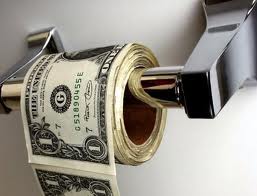I walked back downstairs after dinner last week and found that I had left the light on in the basement. I hadn’t been down there for at least two hours and yet the bulbs still burned bright, lighting up an empty room. Now, usually I don’t think about wasting electricity by leaving lights on, but this little episode stuck out to me. That was really pretty wasteful. I got to thinking about other areas that I might be wasting my resources and realized how easy it was to overlook these things.
Water
One in eight people don’t have access to clean water. I’ve been blessed to have access to clean water any time that I want, in whatever quantity that I want. While I try not to leave water running or wash half loads of laundry, I can probably still cut back on the amount of water that I use.
In the apartment we lived in earlier this year, the bill was included in the price (they said water was ‘free’ but there’s no such thing as a free lunch!) Since we didn’t have to pay a water bill, I was much less careful about my water use. Now, since I pay each water bill monthly, I’m more careful to conserve, which really is a good thing.
Food
We don’t need to get too technical on the things we waste; food, water, and electricity seem so basic to us, but it’s really easy to waste these things. One way that we try to curb our food waste is to separate, freeze, and reheat.
- Separate – When we by food in bulk, we take and separate it into easy to manage Ziploc containers. This helps us to plan ahead for the week’s meals and also keeps us from making too much when it comes time to cook the food.
- Freeze – Once the food is separated, we can freeze it. We just get in the habit of freezing food, which saves us in the long run. We quickly learned the value of freezing food after a few spoiled packages cost us a good dollar. Now we take the time to freeze food.
- Reheat – When we have leftovers, we like to make up the next day’s lunch. There’s a much better chance that we’ll reheat it if it’s already put in a container. One thing that I could get better at, though, is putting a smaller portion on my plate in the first place! Then we’d be more likely to have a full meal for the next day, instead of wasteful scraps from my plate.
It’s hard to change consumption habits, so I can’t expect to become the most conservative consumer out there over night. But what I do know is that when I try for the small ‘wins’ I often see big ‘wins’ happen easier.
I have a theory too. If I can practice being conservative with things like water and food, I think it’ll help shape the way I use other things, including money and time. It all flows back to behavior and when you promote discipline in the small areas, it becomes easier to have discipline in the bigger things – like your budget 🙂
Have you had any small wins lately? What have you tried to cut back on?
Tim is a personal finance writer at Faith and Finance a Christian financial help blog that provides financial insights for individuals, businesses, and churches. Outside of finance, Tim enjoys spending time with his wife, playing the saxophone, reading economics books, and a good game of RISK or Catan. Find him on Twitter and Facebook and subscribe to the Faith and Finance RSS feed.

Leave a Reply